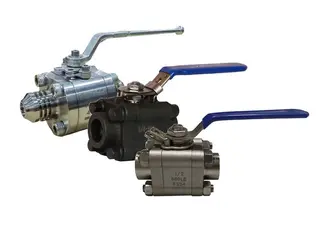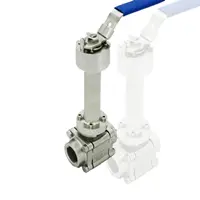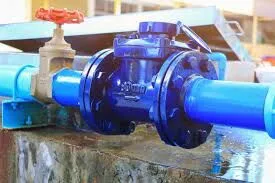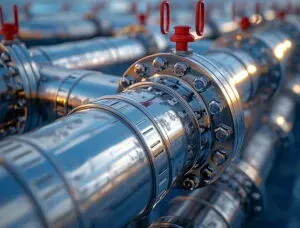Forged Steel Ball Valves: Advantages, Structure & Principle
In today's highly advanced industrial sector, the stability and safety of fluid control systems play a critical role in production efficiency and product quality. As the core components of these systems, valves directly influence the operational status of the entire network. Among the many types of valves, forged steel ball valves have gradually become the preferred choice for engineers and enterprises due to their outstanding performance and wide range of applications. Whether in chemical, petroleum, natural gas, or metallurgical industries, forged steel ball valves can operate reliably under harsh conditions, ensuring both safety and efficiency. This article delves into the advantages, structure, working principle, and differences between forged and cast ball valves, providing a comprehensive guide to selecting the right valve for your industrial project.
Advantages of Forged Steel Ball Valves
In industrial piping systems, valves are key components for controlling fluid flow. Forged steel ball valves stand out due to their exceptional performance, making them the preferred choice across multiple industrial sectors. The following highlights their advantages, which enable reliable operation under complex working conditions.
1. High Strength and Corrosion Resistance
Forged steel ball valves are made from high-strength steel, providing both structural robustness and excellent corrosion resistance. This allows them to operate stably in harsh environments, whether acidic, alkaline, or containing corrosive media. For example, in the chemical industry, pipelines often transport highly corrosive substances, and the corrosion resistance of forged steel ball valves makes them an ideal solution.
2. High-Temperature and High-Pressure Adaptability
Many industrial systems require operation under high temperature and pressure. Forged steel ball valves can withstand pressures of several hundred megapascals and maintain reliable sealing performance even under extreme heat. This makes them widely used in industries such as thermal power generation and oil and gas extraction. For instance, in steam piping systems of thermal power plants, where temperature and pressure are extremely high, forged steel ball valves ensure safe flow control and reliable shutoff.
3. Quick Operation and Precise Control
The design of forged steel ball valves enables rapid opening and closing. A simple rotation can quickly start or stop fluid flow, which is critical in systems requiring frequent flow adjustments. Moreover, they offer high control precision, allowing accurate regulation of fluid flow to meet specific process needs. For example, in oil refining, precise flow control of crude oil can be easily achieved with a forged steel ball valve.
4. Superior Sealing Performance
Sealing performance is a core indicator for valves, and forged steel ball valves excel in this area. Their spherical design, combined with precision-machined and polished sealing surfaces between the ball and seat, ensures tight sealing, effectively preventing leaks. Whether for gas or liquid, they guarantee zero leakage, which is essential for environmental safety and system reliability. For example, in natural gas pipelines, leaks can cause serious hazards, which forged steel ball valves help prevent.
5. Simple Maintenance
Forged steel ball valves feature a relatively simple structure, primarily composed of the body, bonnet, ball, stem, sealing ring, and actuator. This simplicity makes installation and maintenance straightforward. Even after prolonged operation, repair or replacement of components can be completed quickly, minimizing downtime. For instance, in high-temperature metallurgical furnace piping, rapid maintenance is essential, and the ease of maintaining forged steel ball valves makes them ideal.
6. Long Service Life and Low Maintenance Cost
Manufactured from high-strength steel and precision-forged, forged steel ball valves have a long service life. Under normal conditions, they can operate for many years with minimal maintenance or replacement, reducing maintenance costs and enhancing overall system efficiency. For example, in long-term natural gas pipelines, their longevity significantly lowers maintenance expenditure and improves economic efficiency.
7. Multiple Design Options
Forged steel ball valves offer several body-bonnet connection types to meet various applications:
Bolted Body-Bonnet: Facilitates maintenance; the body and bonnet are bolted together with a spiral-wound gasket.
Welded Body-Bonnet: Fully welded for no external leakage, ideal for environments with stringent sealing requirements.
Pressure Self-Tightening Bonnet: The body and bonnet are threaded, using an internal pressure-sealing ring; higher internal pressure enhances sealing.
These design options provide users with flexibility to select the most suitable valve for their specific needs.
8. Low Fluid Resistance
Forged steel ball valves exhibit low fluid resistance, with minimal erosion on the sealing surfaces. This results in low pressure loss, maintaining overall system efficiency. Additionally, operation requires less effort, and flow is unrestricted, further improving performance. For instance, in oil pipelines, low fluid resistance reduces energy consumption and increases transport efficiency.
9. Wide Range of Applications
Forged steel ball valves are widely applicable across chemical, petroleum, natural gas, and metallurgical industries. They can operate reliably in environments containing hydrogen sulfide, impurities, or highly corrosive long-term natural gas pipelines. They are also used in thermal power plants to control various pipelines. Their versatility makes them indispensable in industrial systems.
Structure and Materials of Forged Steel Ball Valves
After understanding their advantages, it is important to examine the internal structure and materials of forged steel ball valves, which contribute to their superior performance.
1. Main Components of Forged Steel Ball Valves
Forged steel ball valves consist of the body, bonnet, ball, stem, sealing ring, and actuator:
Body and Bonnet: Usually made from carbon steel, stainless steel, or alloy steel, forged at high temperature and precision-machined. The forging process ensures a dense internal structure and high strength to withstand high pressure and temperature.
Ball: The core component responsible for opening and regulating fluid flow, usually stainless steel, precision-polished to ensure tight sealing with the seat. Surface quality directly affects sealing performance.
Stem: Connects the actuator to the ball, enabling rotational motion for opening and closing. Typically made from high-strength alloy steel with anti-corrosion treatment.
Sealing Ring: Often made from PTFE or other high-performance plastics to ensure sealing. Material choice is crucial to prevent leakage.
Actuator: Includes manual handles, electric actuators, or pneumatic actuators for controlling ball position. Different actuators allow for manual or automated operation.
2. Forged Steel Ball Valve Material Selection
Forged steel ball valves can be made from materials such as A105, F304, F316, F316L, F51, and F53. These materials offer varying corrosion resistance and mechanical properties to suit different media and working conditions. For example, F316 stainless steel resists chloride environments, while A105 carbon steel is suitable for general industrial use and is more cost-effective.
Forged Steel Ball Valve Working Principle
Forged steel ball valves operate by rotating the ball to open or close the valve:
Open Position: When the stem is rotated 90°, the ball's bore aligns with the pipeline, allowing fluid to flow freely.
Closed Position: Rotating the stem another 90° positions the solid part of the ball to block the flow, achieving complete shutoff. This design enables quick operation and excellent sealing.
Differences Between Forging and Casting Processes for Ball Valves
After understanding the construction and materials of forged steel ball valves, we further explore the differences between forging and casting processes for ball valves. These two manufacturing methods have distinct characteristics and applications, and the choice between them directly affects a valve's performance and service life.
1. Forging Process for Ball Valves
Forging is a manufacturing method that uses forging machinery to apply pressure to metal billets, causing plastic deformation to obtain forgings with specific mechanical properties, shapes, and dimensions. The forging process gives forged steel ball valves extremely high mechanical strength and pressure resistance, allowing them to withstand pressures of several hundred megapascals. Precision-machined balls combined with high-quality sealing rings enable forged steel ball valves to maintain excellent sealing performance even under high-pressure and high-temperature conditions. Valves made from premium materials and treated with special processes can be used long-term in corrosive media.
2. Casting Process for Ball Valves
Casting is a manufacturing method in which molten metal is poured into a mold cavity and allowed to solidify. Cast ball valves generally have lower pressure ratings and larger diameters. The main advantage of casting is the ability to form complex shapes in a single step, making it suitable for large-diameter valves. However, cast ball valves are prone to internal porosity, uneven stress distribution, and generally lower strength and pressure resistance.
3. Key Differences Between the Two
Pressure and Wall Thickness Relationship: Castings have uniform stress distribution and are not limited by pressure direction, whereas forgings have directional internal stresses and can only withstand directional pressure. For the same material and wall thickness, forged components have superior strength and microstructure compared to castings. For ball valves, a cast valve of the same class and material will require thicker walls than a forged valve to achieve the same pressure resistance.
Defect Characteristics: The main defects in cast ball valves include sand holes and gas bubbles, while forged valves may exhibit large grains, work hardening, cracks, or fissures. To ensure quality, castings require heat treatment to relieve stress and non-destructive testing methods such as X-ray, magnetic particle, and dye penetrant inspections. Forgings generally undergo ultrasonic testing.
Dimensional and Shape Limitations: Cast ball valves can be made in large diameters and complex or irregular flow paths. Forged ball valves are denser but cannot form complex flow paths in a single step, often requiring modular design with separate forgings welded together. This limits the size of forged valves and can lead to uneven stress in internal flow paths, potentially causing cracking.
Cost Differences: For the same diameter and pressure rating, forged ball valves are more than twice as expensive as cast valves. Therefore, when selecting a ball valve, both cost and performance requirements must be considered.
Conclusion
Forged steel ball valves are widely used in industrial systems due to their high strength, corrosion resistance, adaptability to high temperature and pressure, fast operation, superior sealing, easy maintenance, long life, and low maintenance cost. Forged manufacturing ensures excellent mechanical and sealing performance under harsh conditions. Compared to cast valves, forged valves offer superior strength, pressure resistance, and sealing, though at a higher cost. Valve selection should balance performance requirements and cost to ensure safe, efficient system operation.
In chemical, petroleum, natural gas, and metallurgical industries, forged steel ball valves are crucial for the safe and reliable operation of fluid control systems. Understanding their advantages, structure, working principle, and differences from cast valves enables informed valve selection, enhancing system performance and economic efficiency.
Send your message to this supplier
Related Articles from the Supplier
Related Articles from China Manufacturers
Nine Advantages of Forged Steel Ball Valves
- Aug 23, 2017
An Introduction to Forged Steel Ball Valves
- Feb 09, 2021
Related Products Mentioned in the Article
Zhejiang Kosen Valve Co., Ltd.
- https://www.kosenvalve.com/
- Address: Dongou Industrial Zone, Oubei, Wenzhou, Zhejiang, China
- Phone: 86 577 5798 7171
- Business Type: Industry & Trading, Manufacturer,
Supplier Website
Source: https://www.kosenvalve.com/media-hub/forged-steel-ball-valves-advantages-structure-principle.html










